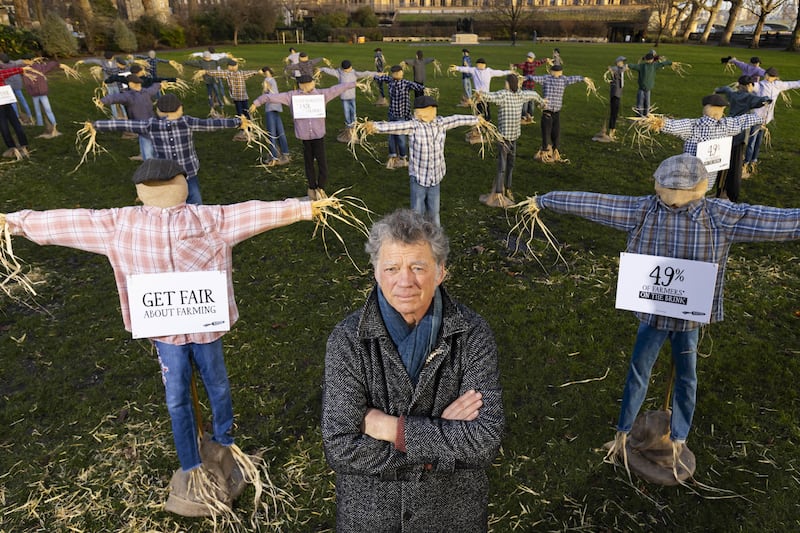British farmers are calling on MPs to support tougher regulations to protect them from “unfair” treatment by the “big six” supermarkets.
A protest by dozens of ‘scarecrows’ outside Parliament on Monday comes as MPs are set to debate reforms to the grocery supply chain after more than 110,000 people signed a petition pressing the Government to overhaul the grocery supply code of practice.
Veg box firm Riverford Organic, which initiated the petition, said the scarecrows standing outside Parliament represented fruit and vegetable farmers who claim it is likely they will go out of business in the next 12 months, with many blaming supermarkets’ buying practices as a threat to their livelihoods.
The petition calls for regulations that ensure supermarkets adhere to “fair” purchasing agreements, including buying agreed quantities and paying the agreed amount on time “without exception”.
Riverford said current government policies failed to provide adequate support for farmers and were rarely enforced.
The campaign has the support of celebrities and leading food industry figures including Ray Mears, Julia Bradbury, Chris Packham, Jimmy Doherty, Rick Stein and Deborah Meaden, as well as organisations such as Sustain and The Soil Association.

Guy Singh-Watson, the founder of Riverford Organic, said: “British agriculture is on its knees. The livelihoods of our farmers are being laid to waste.
“Our 49 scarecrows outside Parliament illustrate the 49% of farmers on the brink of leaving our industry, and I hope this hammers home to those in power the sheer scale of the problem and the urgent need for change.
“Without fairer treatment for farmers, the reality is the destruction of British farming along with the landscape, wildlife and rural communities it once supported.
“For farmers, the clock is ticking. We urge the Government to take action now to safeguard the future of British agriculture.”
William White, sustainable farming campaign co-ordinator at Sustain, said: “Riverford’s scarecrow protest sends a stark message: only strong regulation from the Government can ensure farmers get a fair deal for the food they produce.”
Nick Marston, the chairman of industry body British Berry Growers, said a survey suggested two thirds of growers had little confidence in their future.
The cost of production had increased by 18p per 400g pack since 2021, and while retail shelf prices had risen by 27p pack over this period – an increase of 14.8% – average grower returns were up by just 2.3% or 3.6p.
Mr Marston said: “Growers are struggling with static returns and ever-increasing costs, especially labour costs. This is creating a crisis for British producers who cannot now grow fresh berries on a financially sustainable basis.
“Currently there is no requirement for fair dealing on pricing in the grocery supply code of practice. Supermarkets can put up their prices to shoppers at a push of a button; growers cannot. Growers would like this addressed.
“We need stronger, clearer legislation which will get retailers to commit to being long term partners, paying growers a fair price and buying British when in season. We also need to impose rules to prevent legislation avoidance by retailers by inserting service providers into the chain and for Government to take a strong line on protocol breaches.”

British Retail Consortium director of food and sustainability, Andrew Opie, said: “Food retailers source, and will continue to source, the vast majority of their food from the UK and know they need to pay a sustainable price to farmers.
“Given the pressure on British farmers at the moment, retailers are paying more for their produce. However, retailers are also facing additional costs and are working incredibly hard to limit price increases for consumers during a cost-of-living crisis where many people are struggling to afford the essentials.”
A spokesperson for the Department for Environment, Food and Rural Affairs said: “Our fruit and vegetable farmers are crucial to the resilience of our food system to the wider economy, with 60% of all the food we need being produced in the UK.
“It is only right that British farmers and growers should be paid a fair price, and our review into the fairness of the supply chain will help address these concerns.
“That is alongside delivering on our wider commitments from the Farm to Fork Summit to provide greater stability and resilience for the fresh produce sector.”


